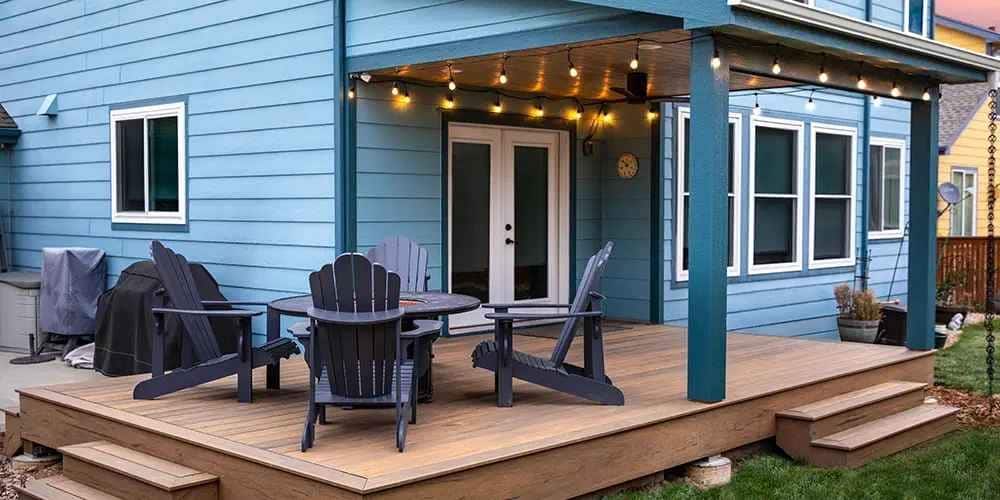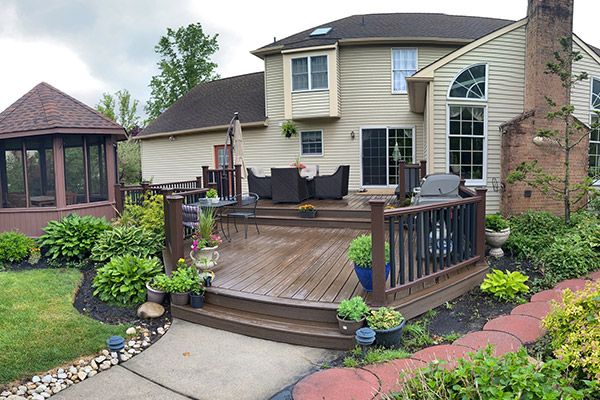Let your outdoor transformation begin with Local Deck Builders Near Me
Let your outdoor transformation begin with Local Deck Builders Near Me
Blog Article
Discovering Various Types and Advantages of Deck: A Comprehensive Guide
The exterior deck is more than just an expansion of one's living room; it's a testimony to individual style, a location for social celebrations, and a refuge to unwind. The choice of decking product substantially affects these aspects, with options varying from the traditional attraction of timber to the practicality of composite, and the resilience of light weight aluminum. Understanding the nuances of these products is vital, so let's begin our expedition, one deck type at a time.
Comprehending the Basics of Decking Material
Outdoor decking material works as the backbone of any kind of deck project, dictating the total visual appeals, resilience, and functionality of the end product. The market offers a large series of products, each with distinct qualities suited to numerous layout preferences and environmental problems. The selection includes all-natural timber, composite, plastic, aluminium, and even concrete. Wood, being the standard selection, provides a timeless, classic allure. Compound, a mixture of timber and plastic, uses wood-like aesthetics with much less maintenance. Plastic and aluminium supply contemporary, minimalistic choices, while concrete is favored for its unequaled longevity. The selection of material dramatically influences the deck's life expectancy, maintenance needs, and resistance to elements. Consequently, comprehending the fundamentals of outdoor decking material is important for a successful deck job.
Advantages and Downsides of Wood Decks
In evaluating deck types, understanding the pros and disadvantages of timber decks ends up being critical. This entails thinking about factors such as the sort of timber chosen and its impact on the deck's efficiency. The succeeding discussion will discover these points in detail to supply a detailed view of the drawbacks and advantages connected with wood decks.

Timber Deck: Disadvantages & pros
The appeal of timber decks can not be overstated. They show a classic appeal and cozy visual that numerous home owners locate tempting. This all-natural material is flexible, enabling a variety of layout opportunities, and can supply an excellent roi.
However, wood decks likewise come with specific disadvantages. Its longevity can be less than other decking materials, especially if not properly cared for.
Choosing Your Timber Type

Exploring the Benefits of Composite Decking
Turning focus to composite decking, it provides one-of-a-kind benefits. Its toughness outshines conventional timber in severe weather condition problems, minimizing the demand for regular upkeep. It offers a pleasing visual charm with variable style alternatives.
Compound Decking Longevity Benefits
Regardless of the plethora of decking alternatives available in the market, composite outdoor decking stands apart for its resilience. This kind of decking, made from a mix of wood and plastic, supplies a durable, long-lasting system resistant to elements that usually degrade other products (Trex Deck Builders Near Me). It doesn't warp, splinter, or fracture, making sure a regularly smooth surface area for years. In addition, it's immune to harm from bugs such as termites, adding to its durability. The integral resistance to fading, discoloration, and scraping is an additional noteworthy advantage. This makes it an optimal selection for outside rooms or high-traffic locations exposed to severe weather. In recap, the resilience benefits of composite outdoor decking provide a lasting, cost-effective service for outside space.
Maintenance of Composite Decks
In addition to sturdiness, composite decking flaunts a major benefit in regards to upkeep. Unlike conventional timber decks, composite decks are not susceptible to rot, warp, or insect damage, therefore substantially decreasing the need i thought about this for routine repair services and substitutes. read this post here They likewise require no sanding, paint, or discoloration, making them a time-saving choice for house owners. Cleansing a composite deck is a simple job, commonly only needing a move or a mild wash with a moderate soap and water. The low-maintenance nature of composite decks not just offers simplicity of maintenance yet also adds to their long-lasting cost-effectiveness. This functional benefit, integrated with the material's fundamental resistance to weathering and degeneration, makes composite outdoor decking a recommended option for several people looking for a resilient and hassle-free decking remedy.
Visual Charm and Variability

The Climbing Appeal of Light Weight Aluminum Decks: Why Pick Them?
As the need for resilient and low-maintenance decking surges, aluminum decks are significantly coming to be the best choice for many home owners and home builders. These decks, made from a light-weight yet tough metal, supply a number of benefits over traditional timber or composite decks. To begin, aluminum is naturally immune to the aspects, meaning it will not warp, split, or discolor over time. he said This makes it a cost-effective choice in the lengthy run. In addition, its non-porous surface protects against the development of mold and mildews, fungis, or insects, guaranteeing a healthy and tidy outdoor area. Aluminum decks are additionally environmentally pleasant, as they are usually made from recycled materials and can be recycled again at the end of their life-span. Their modern-day and sleek visual charm fits well right into modern home designs.
Maintenance Tips for Different Decking Materials
All-natural timber decks require regular discoloring or securing to stop weather condition damage, while composite decks need regular cleaning with soap and water to eliminate discolorations and debris. Recognizing these maintenance needs is important for deck owners to optimize their financial investment and maintain their decks looking their best for years to come.
When Selecting Your Deck Type, factors to Take Into Consideration.
Composite decks withstand moisture well, making them excellent for rainy or moist areas. While some may desire a lavish, unique timber deck, budget restrictions might require a much more economical option like pressure-treated timber. Hence, environment, upkeep, way of life, and expense are essential considerations in deck selection.
Conclusion
Timber decks enchant with all-natural appeal, while composite and aluminum ranges supply resilience and reduced maintenance. Before dedicating to a specific deck kind, home owners need to carefully take into consideration the advantages, drawbacks, and maintenance requirements of each product.
In reviewing deck types, recognizing the pros and cons of wood decks comes to be important.Despite the plethora of decking choices available in the market, composite decking stands out for its resilience. Unlike conventional timber decks, composite decks are not susceptible to rot, warp, or insect damage, therefore substantially decreasing the demand for normal repair work and replacements. These decks, made from a light-weight yet strong steel, provide numerous advantages over traditional timber or composite decks. All-natural wood decks call for normal staining or securing to prevent weather damage, while composite decks need regular cleaning with soap and water to remove spots and particles.
Report this page